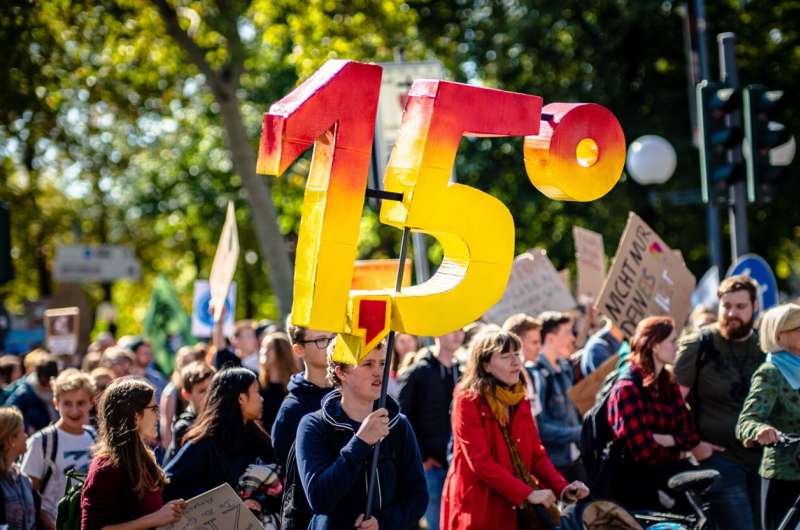
Credit: Unsplash/CC0 Public Domain
The emission reductions in the 11 high-income countries that have “decoupled” CO2 emissions from Gross Domestic Product (GDP) fall far short of the reductions that are necessary to limit global warming to 1.5°C or even just to “well below 2°C” and comply with international fairness principles, as required by the Paris Agreement, according to a paper published in The Lancet Planetary Health journal.
Politicians and media have been celebrating recent decoupling achievements of high-income countries as “green growth”—claiming this could reconcile economic growth with climate targets. To investigate this claim, the new study compared carbon emission reductions in these countries with the reductions required under the Paris Agreement.
“There is nothing green about economic growth in high-income countries,” says lead author of the study, Jefim Vogel, from the Sustainability Research Institute at the University of Leeds, UK.
“It is a recipe for climate breakdown and further climate injustice. Calling such highly insufficient emission reductions ‘green growth’ is misleading, it is essentially greenwashing. For growth to be legitimately considered ‘green,’ it must be consistent with the climate targets and fairness principles of the Paris Agreement—but high-income countries have not achieved anything close to this, and are highly unlikely to achieve it in the future.”
“Continued economic growth in high-income countries is at odds with the twin goal of averting catastrophic climate breakdown and upholding fairness principles that protect development prospects in lower-income countries. In other words, further economic growth in high-income countries is harmful, dangerous, and unjust.”
The study identified 11 high-income countries that achieved “absolute decoupling” (defined as decreasing CO2 emissions alongside increasing GDP) between 2013 and 2019, which were Australia, Austria, Belgium, Canada, Denmark, France, Germany, Luxembourg, the Netherlands, Sweden, and the United Kingdom.
For each country, it compares “business-as-usual” future emission reduction rates to the “Paris-compliant” rates needed to comply with the country’s “fair-share” (or population-proportionate share) of the respective global carbon budget that must not be exceeded if we are to limit global warming to 1.5°C (the aspirational Paris target) or even just to 1.7°C (reflecting the lower-ambition Paris target of “well below 2°C”).
None of the high-income countries who have “decoupled” emissions from growth have achieved emission reductions anywhere near fast enough to be Paris-compliant. At current rates, these countries would on average take over 200 years to get their emissions close to zero, and would emit more than 27 times their fair share of the global carbon budget for 1.5°C.
The scale of the gap between achieved and Paris-compliant emission reductions is dramatic. Among the 11 high-income countries examined, emission reductions between 2013 and 2019 were on average just 1.6% per year. By contrast, reduction rates of 30% per year are needed by 2025 for countries to comply with their fair-shares of the global carbon budget for 1.5°C.
Countries varied in how far they fell short from the reductions required to stay within their 1.5°C fair-shares. However, even the best-performing country, the United Kingdom, would need to reduce its emissions five times faster by 2025 (from its 2013–2019 average of 3.1% per year to 16% per year by 2025).
Other countries would need even greater accelerations of their emission reductions—with Belgium, Australia, Austria, Canada, and Germany needing to reduce their emissions more than 30 times faster than they did between 2013 and 2019 under absolute decoupling.
Even a less ambitious and more dangerous target of limiting global warming to 1.7°C, with the same fairness requirements, would require average annual emission reductions by 2025 to be eight times faster than what was achieved between 2013 and 2019. Therefore, the authors argue that for most high-income countries, even this less ambitious target appears out of reach within a growth-oriented approach.
In light of their findings, the authors say that attempts to pursue “green growth” in high-income countries will not deliver the emission reductions required to meet the climate targets and fairness principles of the Paris Agreement, and argue that a “post-growth” approach is needed instead.
Co-author of the study, Professor Jason Hickel from the Institute for Environmental Science and Technology at the Autonomous University of Barcelona (ICTA-UAB) in Spain, explains, “The pursuit of economic growth in high-income countries makes it virtually impossible to achieve the required emission reductions. If high-income countries are to meet their Paris obligations, they should pursue post-growth approaches: scale down energy-intensive and less-necessary forms of production, reduce the consumption of the rich, shift from private cars to public transit. This reduces energy demand and enables us to decarbonize much faster.”
Professor Hickel continues, “We also need to accelerate renewable energy deployment and efficiency improvements with public financing. Post-growth can help by liberating productive capacities—factories, labor, materials—that can be remobilized to achieve urgent social and ecological goals. Policies like a green job guarantee can be used for this, ending unemployment and ensuring adequate livelihoods for all. We should focus the economy on what is required for well-being, fairness, and ecological sustainability.”
The authors suggest a range of steps that policymakers can take to speed up emission reductions in fair and socially beneficial ways:
- Shifting away from economic growth as a core objective, and instead prioritizing ecological sustainability, well-being, and fairness as development objectives.
- Scaling down carbon-intensive and unnecessary forms of production and consumption (e.g. SUVs, air travel, industrial meat and dairy, fast fashion, cruises, mansions, private jets).
- Reducing inequalities in income and wealth (e.g. via wealth taxes and maximum income thresholds).
- Insulating buildings, and repurposing buildings to minimize new builds.
- Reducing food waste and shifting to agro-ecological farming techniques and predominantly plant-based diets.
- Introducing laws to lengthen product lifespans, and guarantee rights to repair.
- Shifting away from private cars and improving public transit, bike systems and walkability.
Lead author Jefim Vogel explains, “Moving away from economic growth towards post-growth is fundamentally different from a recession, it does not entail hardship or loss of livelihoods. Post-growth can secure and improve livelihoods and well-being without economic growth, through policies such as a public job guarantee, worktime reduction, living wages, a minimum income guarantee, and universal access to affordable housing and quality public services.”
Co-author Professor Jason Hickel concludes, “This year’s devastating climate extremes are a dire warning of where we are headed. If we are to prevent even more catastrophic climate breakdown, high-income countries urgently need to pursue post-growth approaches that slash emissions while enhancing well-being and fairness.”
Unlike high-income countries, the authors note that lower-income nations have lower emissions per capita, making it more achievable for them to stay within their carbon budget fair-shares, even while increasing their production and consumption for human development objectives. Countries like Uruguay and Mexico are already making strides in this direction.
With sufficient access to finance and technology, and a development strategy focused on human needs, lower-income countries should be able to stay within their carbon budgets fair-shares while increasing production and consumption to levels needed to achieve decent living standards for all.
The authors note some limitations of their study. The data does not include emissions from agriculture, forestry, and land use, nor emissions from international aviation and shipping. If included, high-income countries would need to reduce their emissions even faster to comply with the Paris Agreement.
They also note that their approach of distributing “fair-shares” of the remaining global carbon budget to countries in proportion to their population size should be considered a minimum interpretation of the fairness principles set out in the Paris Agreement, because this approach does not directly account for historical inequality in emissions (which the authors argue must be compensated in other ways).
Stronger interpretations of fairness would however result in smaller carbon budget shares for high-income countries, and thus require even faster emission reductions, making growth-based approaches even more unsuitable, and putting green growth even further out of reach.
More information:
Is green growth happening? An empirical analysis of achieved versus Paris-compliant CO2–GDP decoupling in high-income countries, The Lancet Planetary Health (2023). www.thelancet.com/journals/lan … (23)01051-6/fulltext
Citation:
Experts warn ‘green growth’ in high income countries is not happening, call for ‘post-growth’ climate policies (2023, September 4)
retrieved 24 September 2023
from https://phys.org/news/2023-09-experts-green-growth-high-income.html
This document is subject to copyright. Apart from any fair dealing for the purpose of private study or research, no
part may be reproduced without the written permission. The content is provided for information purposes only.
Note: This article have been indexed to our site. We do not claim legitimacy, ownership or copyright of any of the content above. To see the article at original source Click Here












